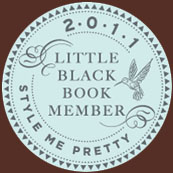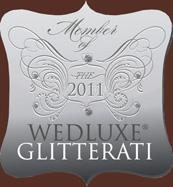calgary herald
Quickie Anyone…??
Tuesday, May 12th, 2009 | etiquette, media, Q&A, weddings | No Comments
ORIGINALLY PUBLISHED IN THE CALGARY HERALD, SEPTEMBER 2005, IN LISA HANSLIP’S COLUMN “I DO, BUT DON’T…”

The long road from happy engagement to wedded bliss is paved with potential etiquette faux pas. Wedding planner Lisa Hanslip is here to help you resist your inner Bridezilla along the way.
Q. My fiancée and I just got engaged about a week ago but we’d really like to get married this fall. Is there any way to plan a nice wedding for about 50 guests in less than two months?
A. Absolutely! Whether you have five weeks, six months or two years to plan your wedding it is possible to have a lovely memorable event. However, when you’re planning a wedding in a short time frame it is imperative that you be flexible (we’re talking major, look like a pretzel, contortionist flexible).
Regardless of how much time you have to plan your wedding, when you are inviting less than 75 guests your options are immensely greater than if you are having a fête for 300.
If you’re having a wedding in the spring or fall there’s a chance that traditional venues like hotels and community halls may have an opening. You might want to consider having your wedding on some day other than Saturday – which will give you more options, whatever your time frame.
Don’t overlook all the great restaurants that can accommodate 50 or 60 people and provide both great ambience and great service. Restaurants are often the most amenable to special requests for weddings and are best equipped to deal with last minute bookings.
As for all the other vendors you’ll need to figure out which ones are available and go from there.
If getting married soon is your priority be prepared for the possibility that your wedding won’t look exactly as planned (What do you mean I can’t have 500 tulips by next Thursday? Yes…I do realize it’s October…). So, get your dialing finger ready, start chanting your “I am flexible” mantra, and in less than two months you can be ready to say “I do!”
The Marvels & Mishaps of Marital Melting Pots
Wednesday, May 6th, 2009 | etiquette, media, Q&A, weddings | No Comments
ORIGINALLY PUBLISHED IN THE CALGARY HERALD, SEPTEMBER 2005, IN LISA HANSLIP’S COLUMN “I DO, BUT DON’T…”
Q. My fiancé & I have been engaged for a few months now but we haven’t planned anything yet because we don’t really know where to begin. I am Catholic and he is Hindu and we both plan to continue in our respective faiths after we’re married. We have no idea how to incorporate both of these things into one wedding so that we honour our families and our traditions but also reflect us as a couple. What should we do?
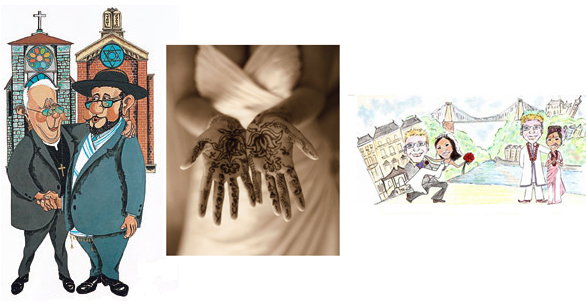
A. According to statistics, at least one-quarter of all marriages in North America are considered interfaith (which can mean anything from a Baptist-Lutheran union to your impending Catholic-Hindu nuptials).
Sometimes it can be quite easy to incorporate the two ceremonies: Two officiants can be present and share in the duties, for example, have the bride’s officiant perform the actual ceremony and the groom’s officiant can say the opening comments and the final blessing; or, if the two officants are amenable you can have them alternate back and forth throughout the ceremony providing equal components from both backgrounds (if they’re not so agreeable make sure they duke it out well in advance of your wedding day – the black eyes might frighten your guests).
Sometimes it requires a bit of imagination, but is still completely feasible: A priest and a rabbi (no…there’s no duck or rowboat involved…) can each perform the pertinent marriage rituals – as long as all involved are open to the situation you can still have the Catholic liturgy and vows, followed by the Jewish seven blessings and the breaking of the glass.
However, there are those situations where it is virtually impossible to blend the two ceremonies (yes – this means you…): No matter how much negotiation goes into this dual ceremony it will be very difficult to appease everyone (at the very least your parish priest might be a bit startled by the fire on the altar).
The best idea when uniting two diametrically opposed wedding ceremonies is to keep them separate. Instead of having six or seven days of Hindu events you might consider scaling it back to three or four days. Have the two ceremonies a day apart – or if you don’t mind foregoing one of the receptions (but remember that means only one wedding cake) have the Catholic ceremony in the morning, begin the Hindu ceremony early afternoon and then have one very festive reception that evening.
Best wishes & Namaste!
Back-off Mom…It’s My Turn!!
Wednesday, April 29th, 2009 | etiquette, media, Q&A, trends, weddings | 5 Comments
ORIGINALLY PUBLISHED IN THE CALGARY HERALD, AUGUST 2005, IN LISA HANSLIP’S COLUMN “I DO, BUT DON’T…”

Q. We’ve recently started planning our wedding and it seems like everyone has an opinion about how everything is supposed to be done. No one really agrees which one is the “right” way, but I’m fairly certain a lot of them are definitely the wrong way. I really like my future in-laws, but their ideas are making me cringe. I don’t want to offend them – but how do I tell them that their plans are way off base?
A. Getting everyone to agree on details when planning a wedding can often require more tact and patience than a UN peacekeeping summit. You want to make sure that you’re following protocol, and do not offend your guests. However, while you are planning your wedding you are also establishing a relationship with your future in-laws and don’t want to cause hard feelings that may still be lingering when it comes time to plan your 25th anniversary party.
If the details in question are small (your future mother-in-law wants programs that include all the readings for your ceremony and you don’t), the best idea is to let them go – by letting her take charge of something you don’t care too much about – it might take the attention off a more contentious issue. If they’re a big deal like she is determined your wedding colours should be purple and green (or some other combination you find equally distasteful), or she decided she didn’t get to invite enough people and has had her own invitations printed (even though you’ve already invited more people than the venue will hold) – then something should be said – but not by you. It will make for far less hurt feelings to always have your fiancé deal with issues involving his family, and you with yours (bringing in those UN peacekeeping forces might be a wise idea also).
Here are a few tried and tested rules of etiquette that will help the bride and groom, their families and the guests from pulling their (or anyone else’s) hair out:
• The mother of the bride or mother of the groom should never host the bridal shower.
• Don’t invite 400 people if you can only afford to host 100 – and similarly don’t invite throngs of people you know cannot attend in hopes they’ll send a gift.
• Make sure your guests feel welcome – think about details like parking and dietary restrictions – and don’t expect them to pay for anything at your wedding.
• Don’t refer to gifts or gift registries with the wedding invitations; however it is ok in the bridal shower invitations as the bride or bride’s family is not hosting (see above).
• The rules of “who pays for what” are traditional – but don’t be unreasonable: don’t ask the groom’s family for money – but don’t be shy about discussing the realities of the financial situation and accepting help or to split costs.
• The bride and groom must send a written thank-you note for every gift (yes, even those crocheted place mats!) – and do so in a timely manner – aim to get them out in a month – but absolutely no later than three months after the wedding.
Good luck with your in-laws…but don’t let anyone make you lose sight of the fact that the day is about you and your fiancé…enjoy!
What’s a bride to do with the mystery gifts?
Tuesday, April 14th, 2009 | etiquette, media, Q&A, weddings | No Comments
ORIGINALLY PUBLISHED IN THE CALGARY HERALD, JULY 2005, IN LISA HANSLIP’S COLUMN “I DO, BUT DON’T…”

Q. We just got married a couple of weeks ago and there are a couple of things we’re a bit concerned about: there were a few gifts that seemed to have lost their cards (we can “sort of” figure out who they are from based on some cards that weren’t attached to anything) and a couple of guests who normally always observe stringent rules of etiquette but didn’t give us anything – and we’re worried that maybe it got lost. Should we actually ask them (what if they actually didn’t buy us a gift – then it would be weird, wouldn’t it?)?
A. There always seem to be a few gifts that manage to lose their cards, and a few guests that amazingly seem to attend a wedding without giving a gift.
As for the guests with no gifts – this is both cheap and tacky (always a marvelous combination). Ideally, wedding guests arrange for the couple to receive their gift before the wedding – so someone doesn’t have to be responsible for getting all the gifts home from the reception.
Attention all wedding guests: although it is completely appropriate to give the newlyweds their gift anytime in the first year of marriage – if you plan to wait, whatever the reason, tell them (“We’re very sorry your gift is not here – it will be arriving at your door in six to eight months – it’s being delivered by pack mule from Argentina!”). This will save the poor couple from worrying that your gift got lost (or from deciding you’re a big cheapskate).
As for the etiquette sticklers that did not give you a gift or mention the absence of one…this is a sticky situation. Perhaps just tell them you’re worried that their gift went missing and were curious if they left it on the gift table at the reception (who knows, maybe they forgot it in the trunk of their car, or it is sitting carefully in a closet at their house).
Now…where Emily Post dictates a wedding guest has a year to give a gift – it is quite the opposite on the thank you card front. Everyone knows you’re very busy – but don’t make your guests wait forever for their thank you cards. You absolutely must send them within three months of your wedding day…no slacking! If there are a couple of cards that were not attached to anything – and a couple of gifts with no cards – simply thank them for the “lovely gift”.
So all you wedding guests out there – if you attend the wedding – give them a gift – and if it will be coming some time in the future – tell them! If you do bring the gift to the reception – make sure you’re actually putting it on the gift table…and get friendly with the scotch tape – don’t make them guess which gift is from you because the card fell off (you don’t want credit for a set of plastic mixing bowls when you actually bought them a silver gravy boat).
What’s a bride with two dads to do?
Tuesday, March 31st, 2009 | etiquette, media, Q&A, weddings | No Comments
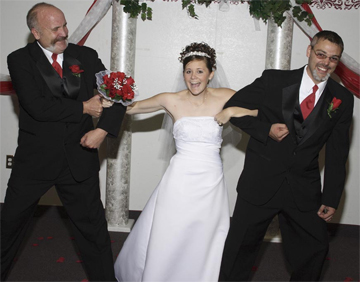
ORIGINALLY PUBLISHED IN THE CALGARY HERALD, JUNE 2005, IN LISA HANSLIP’S COLUMN “I DO, BUT DON’T…”
The long road from happy engagement to wedded bliss is paved with potential etiquette faux pas. Wedding planner Lisa Hanslip is here to help you resist your inner Bridezilla along the way.
Q. I’m getting married in the fall. All the details seem to be coming together nicely except there’s one big problem…My parents divorced when I was eight and my mom re-married shortly after. My step-dad is wonderful and has always basically been the father figure. I am still quite close with my father, though, and I know either would be very disappointed about not walking me down the aisle. What should I do?
A. Hmmm…yes…this is always a very sticky situation when a bride is close to both her father and step-father. Unfortunately, there is never a clear-cut, one-size-fits-all, answer. How you choose to handle this is entirely dependant upon the personalities involved.
If you are very close with both men, etiquette states it is your natural father that should walk you down the aisle. For many brides, though, their step-dad has been so much more involved in their daily lives that it seems an automatic choice to ask him in lieu of their biological parent.
If both men get along and are amiable with each other you can choose to have both of them walk you down the aisle. Strictly speaking, this is a total no-no. However, unless Emily Post (or Dr. Phil) will be onsite to help smooth the ruffled feathers of the “dad” who does not get to walk you down the aisle – this is certainly a viable option. You could either have one escort on either arm, or have your father take you half way, and your step-father the other half. Another option is to choose your natural father to walk you down the aisle, and your stepfather for the father-daughter dance (or vice versa).
The only other option would be to avoid the situation altogether and walk down the aisle alone. From an etiquette perspective, this is a more appropriate compromise than, say, having your mom walk you down the aisle, and can potentially alleviate any hurt feelings. If you’re really worried about it, pick a ceremony venue that has a very skinny aisle (or a ridiculously pouffy dress). Then you can look your dad(s) in the eye and say with confidence…I’m so disappointed, there’s simply not room for anyone beside me. If you opt to go it alone, you could briefly pause to hug them both, and then have your fiancé escort you the last few feet.
It is wonderful to want to observe all the proper etiquette at your wedding…just don’t forget about the potential lifetime of angry glances over the Thanksgiving turkey before you make your final decision.
Lisa Hanslip is a Calgary wedding planner (www. askaweddingplanner.com). Her advice appears regularly on the Love Stories pages.
Hmmm…our venue is on fire…isn’t that delightful!
Tuesday, March 24th, 2009 | etiquette, media, Q&A, weddings | No Comments

ORIGINALLY PUBLISHED IN THE CALGARY HERALD, MAY 2005, IN LISA HANSLIP’S COLUMN “I DO, BUT DON’T…”
Q. Our wedding is a few weeks away and our reception venue just had a big fire. Although we had our hearts set on this location, we decided to book another place close by instead of waiting for the repairs to be completed. What is the proper way to inform our guests? Can we just tell everyone at the ceremony?
A. All sorts of things can pop up (or burn down) when planning a wedding. The venue can double book, the church can flood, the photographer can unexpectedly choose another occupation (what do you mean you’ve really always wanted to be a plumber?), or there can be a family emergency requiring a postponement. Whatever the scenario, it is not uncommon for something to instigate either a change of date or a change of venue.
Typically, the appropriate etiquette to handle a change of wedding details is mailing the new details to your guests. Either a hand written note or a simple card – printed to match your invitations – is acceptable.
Had you decided to postpone your wedding the same rules would apply. It is the top priority to inform your guests if there is a major change – such as a change of date or a change of locale. Every wedding usually has at least a few guests coming from out of town – they’ve graciously taken time off work and made travel arrangements. Your local guests may have arranged baby sitters or transportation. Make sure you tell them…post haste!
With so little time before your wedding date I suggest using the telephone. Although your new venue is nearby, it is courteous to let your guests have some warning. A reminder at the ceremony – either printed on the programs or with a verbal announcement – is always a good idea. However, there are inevitably always a few guests that don’t make it to the ceremony (I told you it was left on Main Street), and even more guests that don’t bother reading the programs (Oh, doesn’t she look beautiful, I wonder what I’ll look like on my wedding day…).
So, enlist your family and your bridesmaids to help you man the phones. Then, take a deep breath and relax (having a fire extinguisher at the ready couldn’t hurt either!). Well done finding a new reception venue so quickly – your wedding will be smooth sailing.
the best man said WHAT???
Monday, March 9th, 2009 | etiquette, media, Q&A | No Comments
ORIGINALLY PUBLISHED IN THE CALGARY HERALD, APRIL 2005, IN LISA HANSLIP’S COLUMN “I DO, BUT DON’T…”
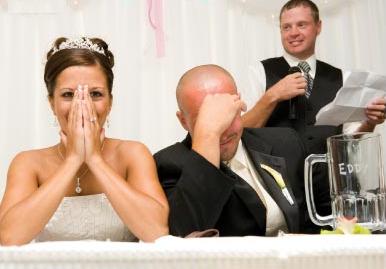
The long road from happy engagement to wedded bliss is paved with potential etiquette faux pas. Wedding planner Lisa Hanslip is here to help you resist your inner Bridezilla along the way.
Q: I’m starting to get a bit nervous about the toasts. We were at a wedding last weekend and the best man was a bit drunk. Not only did he talk too long, but he spent most of the time discussing the groom’s ex-girlfriends. Is there any way to avoid this at our wedding?
A: Absolutely. Feel free to give your family and bridal party some guidelines. Those that plan to give toasts should prepare in advance (written out completely or at least in the form of notes). You don’t want the most memorable thing at your wedding to be how long your uncle droned on about what a talented two-year-old you were, or that the best man rambled endlessly about the groom’s high school high jinks.
There are a few etiquette points to be aware of:
• If seated, stand when offering a toast.
• Keep it simple, and keep it personal.
• To “finish” a toast, raise your glass and say the couple’s names (“To Sally & Ben”), then take a sip. Everyone else will follow your lead.
• When you are the one being toasted, stay seated, and don’t raise your glass.
It is absolutely appropriate to begin by saying you are honoured to share the wedding day with the couple. A good starting point is talking casually about your relationship with the couple and relating one or two quick anecdotes. A nice way to close is by pointing out what’s special about their relationship and why you think they’re perfect for each other.
Dwelling on potentially touchy subjects, like a difference in religion or race, or an unhappy ex-spouse is decidedly NOT appropriate. Don’t apologize for being a bad speaker, or announce you don’t really want to speak. And most definitely don’t talk too much about the bride or groom’s past conquests or be cryptic by telling stories that only the bride & groom will understand (common fodder for the “tipsy toast”).
The most important thing to remember for anyone giving a toast at a wedding is that brevity is the soul of wit. Even if you have a story to tell, don’t use the long version – a wedding toast should never be more than 3-5 minutes long. Very often the errant toast is a result of too many nerves and too little preparation (that sixth glass of champagne probably won’t help either!). So with some helpful hints – and a big deep breath – your fiancé’s best man can deliver a memorable and meaningful toast – and you can relax and enjoy it….Cheers!
Receiving line…yay or nay?
Wednesday, February 25th, 2009 | etiquette, media, Q&A | No Comments
ORIGINALLY PUBLISHED IN THE CALGARY HERALD, APRIL 2005, IN LISA HANSLIP’S COLUMN “I DO, BUT DON’T…”
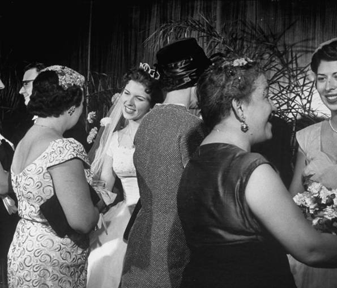
The long road from happy engagement to wedded bliss is paved with potential etiquette faux pas. Wedding planner Lisa Hanslip is here to help you resist your inner Bridezilla along the way.
Q: We’ve been told we need to have a receiving line at our wedding – but we don’t really know when it is supposed to be or even who exactly is supposed to be included – do we really need to have one?
A: Traditionally, it is considered proper etiquette to have a receiving line at any wedding with more than 50 guests. The purpose of the receiving line is to give the hosts and the happy couple an opportunity to personally greet each guest.
The receiving line usually starts with the parents of the bride, followed by the groom, the bride, the parents of the groom, and sometimes the maid of honour. The groomsmen do not participate in the receiving line nor do the bridesmaids (hmmm…eight attendants and 250 wedding guests…we might get to sit down for dinner sometime before their first anniversary).
Today, it is perfectly acceptable not to have a receiving line. If you’re planning to invite enough people to fill all four halls of the Round-Up Centre – it is probably best to skip it. But, if you’ve invited less than 200 people, it can certainly be manageable – and useful: If even your best party-mingling efforts don’t allow you to visit with each guest during the reception – you can relax knowing you spoke with everyone during the receiving line.
The receiving line can be held at the church as people exit or at the reception as people enter. It can be a great way to usher people out of the ceremony or into the reception – but allow enough time so you’re not impinging on your time for wedding photos or the start of dinner. The receiving line can be rather a lengthy process – so count on at least half an hour to greet all of your guests – closer to an hour if you have lots of chatty relatives to contend with.
Just remember – whether or not you have a receiving line – the important thing is that you greet each and every guest and thank them personally for sharing in your big day. If you decide to go for it – make sure your comfy shoes and bottle of Purell are at the ready – and you’ll be all set.
Lisa Hanslip is a Calgary wedding planner (www. askaweddingplanner.com). Her advice appears regularly on the Love Stories pages.
Man of Honour?!?
Monday, February 16th, 2009 | etiquette, media, Q&A, trends, weddings | No Comments
ORIGINALLY PUBLISHED IN THE CALGARY HERALD, MARCH 2005, IN LISA HANSLIP’S COLUMN “I DO, BUT DON’T…”
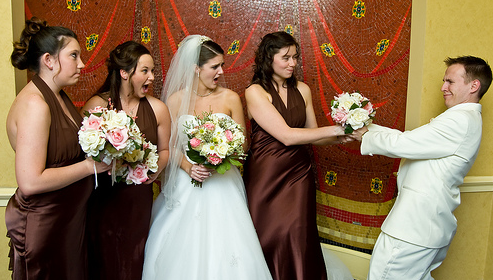
![]()
The long road from happy engagement to wedded bliss is paved with potential etiquette faux pas. Wedding planner Lisa Hanslip is here to help you resist your inner Bridezilla along the way.
Q: I’m having a very hard time choosing a maid of honour. I have a few girlfriends that I’m fairly close to, but my very best friend is a guy. We’ve known each other since junior high – and he’s seen me through everything. Would it be weird to choose him instead of a maid of honour? Should he just dress like the groomsmen? Will I give my grandmother a heart attack?
A: Unconventional, yes! Unexpected, you bet! Acceptable, absolutely!
You want your honour attendant – whether it is a maid of honour, matron of honour or man of honour – to be the person to whom you feel closest. You should choose your best friend, the person you want standing beside you on your big day – not the friend that would look best in the bridesmaid dress.
If you choose a man to be your honour attendant – you may opt to eliminate some of the “typical” duties like hosting your bridal shower, or helping you get into your wedding gown. But the most important part of the job description is being supportive and serving as the legal witness to your marriage.
Choosing your attendants can often be a difficult process – for the bride and the groom. There may be family politics involved. Or, like some, you may have served as a bridesmaid for a dozen of your friends and family members and feel obligated to ask them to stand up for you in return. Well…don’t.
This is your day – and although it is impossible to accommodate everyone’s wishes – you can’t make your choices based on not wanting to offend someone. You can’t make everyone happy – nor can you make everyone your bridesmaid – so just choose those you are currently closest to. You can always assign tasks – like doing a reading or taking care of the guest book – to those you want to feel special and included in your wedding but aren’t in the bridal party.
When you decide on the attire for your attendants, he can wear a suit or tuxedo and coordinate his tie to the other bridesmaids. This scenario also holds true for the groom. It is also perfectly acceptable to have a woman be the best “man.” A best “woman” looks great in a black strapless gown to coordinate with the other groomsmen.
So, feel free to choose your best guy friend or brother to stand up for you at your wedding. Just keep your “man of honour” away from the lavender chiffon and size 11 purple pumps – and your grandmother’s heart should be just fine!
The etiquette of gift registries
Friday, January 30th, 2009 | etiquette, media, Q&A | No Comments
ORIGINALLY PUBLISHED IN THE CALGARY HERALD, FEBRUARY 2005, IN LISA HANSLIP’S COLUMN “I DO, BUT DON’T…”

Q: We recently went to register for our wedding and the store clerk offered us registry enclosure cards to include in our invitations. Is this acceptable? We were also a bit unsure what to register for. Help!
A: No, no, a thousand times, no! It may seem helpful, but it is never acceptable to enclose a registry notice or gift wish list with your invitation. Never. Ever.
One of the major etiquette dangers is the method of informing your guests
about your registries. The stores themselves help perpetuate this
etiquette no-no by offering you the offensive invitation enclosures.
Your gift registry can be one of the most fun aspects of planning your
wedding (“Here, honey, just point this gun at things and voila, they’re on
our wish list!”) but it can also prove to be an etiquette minefield.
The first major issue is the registry itself. Today’s engaged couples
often have established households of their own, so a registry is an
excellent way for your guests to know what you actually need (Oh look!
Another toaster! Everyone needs four toasters, don’t they?). Make sure you
think carefully about what you actually need and make a wish list that is
agreeable to both you and your partner.
Your guests have different budgets, so register for items in a variety of
price ranges. You cannot expect all of your guests to spring for that $400
food processor, or that they will be happy buying you one teaspoon because
at $100 a piece it is the only thing on your registry they can afford. A
thoughtful gift registry gives everyone the opportunity to buy you
something you will love.
These days, it is also perfectly acceptable to register for nontraditional
items such as hardware, sporting goods, charitable donations, or, yes,
even the honeymoon. Keep in mind, though, that although lifestyle gifts
are appropriate, some people are going to prefer giving you something
tangible.
You may prefer to receive money, which is traditional in many cultures, or
contributions to your honeymoon fund, but you cannot tell your guests what
to give you. It is just not polite to request gifts of ANY kind. Giving a
wedding gift is the socially acceptable thing to do – but no one is really
obligated to buy you a gift. Informing your guests what kind of gift you
would like at the same time you are inviting them to your wedding is like
telling them the gift is more important than their attendance.
The way to let people know where you’re registered is via word of mouth.
Make sure your bridal party and family know where you are registered or if
you have a preference for a more non-traditional gift. Then you have to
wait until someone asks where you are registered, and just cross your
fingers!

Categories
Archive
- October 2014
- July 2014
- June 2014
- December 2013
- July 2013
- March 2013
- October 2012
- September 2012
- August 2012
- July 2012
- June 2012
- May 2012
- April 2012
- March 2012
- February 2012
- January 2012
- November 2011
- September 2011
- August 2011
- July 2011
- June 2011
- May 2011
- April 2011
- March 2011
- February 2011
- January 2011
- December 2010
- November 2010
- October 2010
- September 2010
- August 2010
- July 2010
- June 2010
- May 2010
- April 2010
- March 2010
- February 2010
- January 2010
- December 2009
- November 2009
- October 2009
- September 2009
- August 2009
- July 2009
- June 2009
- May 2009
- April 2009
- March 2009
- February 2009
- January 2009
- December 2008
Meta
Search
